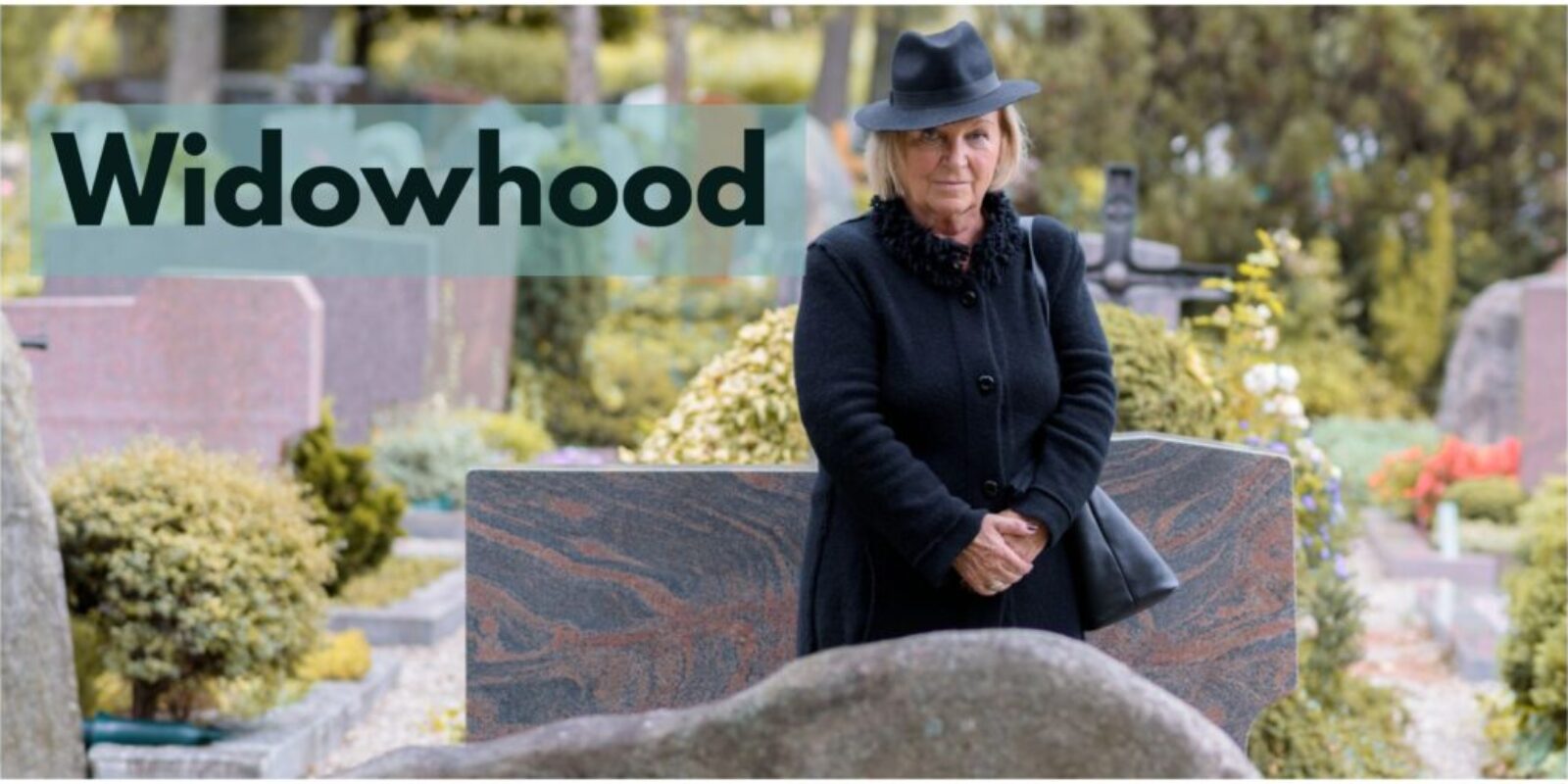Navigating widowhood isn’t easy, right? It’s like suddenly riding a rollercoaster you never bought a ticket for. Apart from the whirlwind of feelings and missing your other half, you might bump into money troubles or some tricky paperwork.
A lot of widows on this path of widowhood find their wallets feeling a bit lighter. And hey, as someone going through widowhood, you might find a bit of a financial silver lining like getting a piece of your late partner’s pension pie, a little something from their last wishes, or a helping hand from social support services.
Stepping through this stuff can be a bit like walking through a thick fog, especially if all those rules and dos and don’ts feel like a foreign language. Understanding what’s coming to you and what you need to tackle is key to ensuring you’re all set for a smooth ride ahead.
Let’s be real, when you’re dealing with widowhood, having a clear map to guide you cna make a world of difference.
The Perils of Widowhood
We’re diving into a topic that’s close to many hearts: navigating the tricky waters of widowhood. Losing your partner isn’t just tough emotionally; it can really shake up who you are and what your future looks like. It’s especially rough for women, who often face extra hurdles, from feeling left out to dealing with money woes that just don’t seem fair.
In this friendly post, we’ll break down the must-knows about superannuation, wills, and the ins and outs of Centrelink—all super important for those who’ve found themselves in widowhood. We’ll chat about things like inheriting super, figuring out what your beloved wanted through their will, and making sense of the whole Centrelink maze.
For anyone who’s found themselves wearing the widowhood shoes recently, or maybe you’ve been walking this path a little longer and are still figuring out the legal and money stuff, we’ve got you. This post is packed with tips and straightforward advice to help you make smart moves for your wallet and your peace of mind.
Our mission? To stand by women facing these tough times, empowering you to find your financial footing and stride forward with confidence. We’re here to arm you with the know-how to tackle the challenges of widowhood head-on, with a bit of grit and a whole lot of grace. Let’s get started!
Prefer to listen rather than read?

Understanding Superannuation
When people in Australia retire, one keyway they keep the cash flowing is through their superannuation, kind of like a big savings pot for later in life. Now, if someone loses their partner, being in widowhood can be tough, and figuring out money matters doesn’t make it any easier. They might be able to get some superannuation benefits from their late partner, but it’s not always a walk in the park.
Widowhood can throw a curveball when it comes to getting those super benefits. It’s not just about being the partner left behind; it’s about the nitty-gritty details, like what kind of super fund the late spouse had and the rules that fund follows. These things really matter.
For a widow or widower to tap into their late partner’s super, they might need to check off some boxes or fit certain rules, depending on the super fund. Now, let’s break down the super fund scene in Australia—there are five main types to know about:
Corporate Funds
These are funds that are established by companies like Qantas or Telstra for their employees. The larger corporate funds are typically not-for-profit and are run by a board of trustees representing the employer and employees.
Smaller corporate funds may operate under the umbrella of a larger retail or industry super fund. They are generally low to medium cost, especially for large corporates, and offer both accumulation and defined benefit funds.
Industry Funds
Industry funds were originally designed for workers in a single industry across multiple work sites but are now open to anyone. They generally have a limited menu of pre-mixed investment options designed to meet most people’s needs, including MySuper accounts.
Larger funds now allow members to create their own investment mix from a range of options. They are generally low-cost, not-for-profit funds that offer both accumulation and pension accounts.
Public Sector Funds
These are not-for-profit funds that were initially created for federal and state government employees, but some are now available to anyone.
They usually offer a limited menu of investment options, including a MySuper option, low fees, and good member services. Some employers contribute more than the minimum Superannuation Guarantee.
Retail Funds
These funds are run by banks and other financial institutions and are open to all investors. Investors who consult a financial adviser/planner are typically offered a retail fund via an administrative platform with access to a wide range of investments.
Retail funds are generally medium to high cost, with advice fees and platform fees, although many now offer a lower-cost MySuper alternative. They offer both accumulation and pension accounts, and the company running the fund retains some profit.
Self-managed superannuation funds (SMSFs)
SMSFs allow DIY investors who want more control or flexibility to run their own super fund or involve their partner, adult children, or other members, up to a maximum of six members. All members must be trustees and are responsible for all decisions made about investments and compliance with relevant laws.
While there is no minimum investment, set-up costs and annual running expenses can be high, especially if teh administration and other services are used. This approach keeps it light, relatable and focused on the human aspect, especially regarding the sensitive topic of widowhood.
Requirements and Criteria for Claiming Benefits
In the event of the death of a member, the fund may provide benefits to the surviving spouse, subject to certain requirements and criteria. The specific requirements and criteria for receiving benefits from a corporate super fund may vary depending on the terms of the fund’s trust deed, as well as any applicable laws and regulations.
The legal process of dealing with a spouse’s estate can be challenging during widowhood.

However, some common requirements and criteria that may apply include:
- Membership
- One of the perils of widowhood is that the surviving spouse may need to be a member of the super fund in order to receive benefits. If they are not already a member, they may need to apply to join the fund.
- Proof of relationship
- The fund may require proof of the relationship between the member and the surviving spouse, such as a marriage certificate or de facto relationship declaration makes it one of the challenges of widowhood. The process of adapting to widowhood can take patience and understanding.
- Notification
- The transition to widowhood can be challenging. The surviving spouse may need to notify the fund of the member’s death and provide any necessary documentation, such as a death certificate.
- Waiting period
- The fund may have a waiting period before benefits can be paid to the surviving spouse. This waiting period may vary depending on the terms of the fund.
- Benefit payment options
- The fund may offer different payment options to the surviving spouse, such as a lump sum payment or regular pension payments.
- Taxation
- The tax implications of receiving benefits from a super fund can be complex and may depend on various factors, including the type of benefit payment and the age of the surviving spouse. The fund may provide information or advice on the tax implications of receiving benefits.
Again, it can be challenging to navigate the financial implications of widowhood. It’s important to note that these are the general guidelines and specific requirements, and the criteria for receiving benefits from a corporate super fund can vary depending on the fund’s individual terms and any applicable laws and regulations. It’s important for the surviving spouse to carefully review the fund’s terms and seek professional advice if necessary.
For example, if the fund is a self-managed superannuation fund (SMSF), the surviving spouse may need to become a trustee of the fund in order to receive the benefits. While in industry funds, in addition to the requirements mentioned above, they may also require the surviving spouse to have been in a spousal relationship with the member for a certain length of time before they can claim benefits.
The requirements for a surviving spouse to claim benefits from a public sector fund may include meeting certain age or service requirements, providing proof of the member’s death and their relationship to the member, and notifying the fund of the death. The requirements for public sector funds can vary depending on the particular fund and the relevant government legislation.
Corporate funds may also have additional requirements, such as requiring the member to have nominated their spouse as a beneficiary or requiring the spouse to have been financially dependent on the member at the time of their death.
It’s important for surviving spouses to seek professional financial advice when dealing with superannuation, to ensure that they understand their entitlements and obligations.
Dealing with Wills
Will plays an important role in the transfer of assets after a person’s death, and it can be particularly significant for widows. The surviving spouse may be left to navigate the complexities of probate, which can be a difficult and time-consuming process. Here are some key aspects to consider:
The Importance of a Will
- A will is a legal document that outlines how a person’s assets will be distributed after they die. It can also name a guardian for any minor children and an executor to manage the estate. Having a will in place can make the probate process smoother and less complicated for the surviving spouse.
Probate Process
- Widowhood can also bring about feelings of anxiety and uncertainty. When a person passes away and leaves a will, the will typically names an executor who is responsible for administering the deceased person’s estate according to the terms of the will.
- The executor is usually named in the will and has the legal authority to manage the estate and distribute the assets to the beneficiaries named in the will.
Contested Wills
- When someone passes away and leaves a will, it’s supposed to be a clear-cut document that outlines their wishes for how their assets should be distributed. However, sometimes, one or more parties might dispute the validity of the will. When this happens, it’s called a contested will.
- There are several reasons why a will might be contested. For example, someone might claim that the deceased was under duress or undue influence when they created the will, meaning they were pressured or manipulated into making certain decisions. Alternatively, someone might argue that the deceased wasn’t of sound mind when they created the will, so their wishes shouldn’t be considered valid.
- When a will is contested, the probate process can become more complicated and time-consuming. This is because the court will need to review the evidence and arguments presented by each party and determine whether the will is valid or not. This can be a lengthy process that involves legal representation and can be emotionally difficult for all parties involved.
- If a will is deemed invalid, then the deceased’s assets will be distributed according to the laws of the state where they lived. This can be a very different outcome than what the deceased had intended, which is why it’s important to create a clear and legally valid will if possible.
Estate Taxes
- When a person dies, their estate may be subject to federal or state estate taxes. These taxes are based on the value of the estate and can be substantial, particularly for larger estates. The surviving spouse may be responsible for paying any estate taxes owed by the estate. The legal process of dealing with a spouse’s estate can be challenging during widowhood.
Intestacy
- If the deceased spouse did not have a will, their estate would be distributed according to state law, which may not align with their wishes. This is known as intestacy, and it can be particularly challenging for the surviving spouse if they are not the legal heir to some or all of the assets. It’s important to seek help and support during the widowhood process if needed.
It can be challenging to navigate the legal aspects of widowhood, such as estate planning and inheritance. However, having a will in place can make the process smoother, but it is important to understand the potential challenges and complexities involved, including contested wills, estate taxes, and intestacy.
Seeking legal advice and representation may be necessary to navigate these challenges and ensure a fair distribution of assets.
Understanding Centrelink Benefits
Centrelink is like a government agency in Australia that gives a hand with money and support to eligible individuals and families who need it. Now, if you’re a widow, you might be able to get something called the Age Pension.
It’s a bit of money that comes your way regularly if you’re of a certain age and your income is within certain limits. This money is there to help with day-to-day costs, making life a bit easier in widowhood.
Centrelink is a government agency in Australia that provides a range of social security services and financial support to eligible individuals and families. The Age Pension is one of the most common Centrelink benefits that widows may be eligible for if they meet certain age and income criteria. This pension can provide regular income support to help cover living expenses.
Also, if you’ve recently lost your spouse, you might be able to get a special one-time cash help called the Bereavement Payment. It’s there to give you a hand with the funeral bills and some other costs you might run into when dealing with the loss of your loved one.
However, navigating the Centrelink system can be challenging for some, particularly for those who have never dealt with it before. The process can involve a significant amount of paperwork and documentation, and it can be difficult to understand the specific eligibility criteria and requirements.

Claiming a Bereavement Payment in the Centrelink system involves several steps, including determining eligibility, gathering necessary documents, and submitting a claim.
- First, the surviving spouse must determine if they are eligible for the Bereavement Payment. To be eligible, the deceased must have paid National Insurance contributions or die as a result of their work, and the surviving spouse must have been living with the deceased at the time of their death.
- Once eligibility has been determined, the surviving spouse will need to gather the necessary documents, which may include a death certificate, marriage certificate, and the deceased’s National Insurance number.
- After the required documents are obtained, the surviving spouse can submit a claim for the Bereavement Payment. This can be done online, over the phone, or in person at a Centrelink office. The claim will require information about the surviving spouse’s financial situation, such as income and assets.
- Once the claim is submitted, Centrelink will assess the application and may request additional information or documents. If approved, the Bereavement Payment will be paid directly to the surviving spouse’s bank account.
It can be helpful to connect with other widows who have gone through similar experiences during widowhood. It is important to note that the amount of the Bereavement Payment can vary depending on a number of factors, including the deceased’s National Insurance contributions and the surviving spouse’s financial situation. Additionally, the process of claiming Centrelink benefits can be complex and confusing, so it may be helpful to seek assistance from a financial advisor or Centrelink representative.
It is important for widows to seek professional advice and support from a financial planner or Centrelink representative to ensure they receive the benefits they are entitled to and to make the process as smooth as possible. It’s important for surviving spouses to understand their eligibility for Centrelink benefits and to seek professional financial advice to ensure that they are receiving all the benefits they are entitled to.
Conclusion
In conclusion, losing a spouse is an emotional and difficult time. It’s important to remember that there is no set timeline for grieving during widowhood. However, understanding the financial challenges and seeking professional advice can help to alleviate some of teh stress and uncertainty that comes with it. By taking steps to manage finances effectively, widows and widowers can focus on healing and adjusting to life without their partners. Coping with the grief of widowhood can be a lifelong journey.
Support from family and friends can be critical during the period of widowhood. It’s important to remember that there is support available and reaching out for help can make all the difference during this transitional period. Navigating the perils of widowhood can be challenging, but seeking advice from financial and legal professionals can help ease the burden. Remember to take care of yourself during this difficult time and seek support from family and friends.
If you found this post helpful, you may also benefit from reading our article on The Menopause Maze: A Comprehensive Guide to Understanding and Managing Symptoms. Whether you are currently going through menopause or simply interested in learning more, this guide is a valuable resource for women of all ages.
Disclaimer:
We are not investment advisors. Our content is intended for guidance and educational purposes only. Before making any investment decisions, it is strongly recommended that you seek advice from a licensed financial advisor or conduct thorough research to ensure that your choices align with your individual financial goals and risk tolerance.
Please remember that all investments carry inherent risks, and past performance is not indicative of future results.



